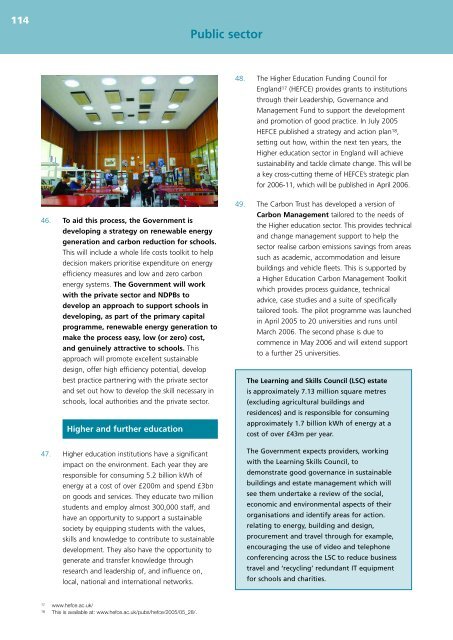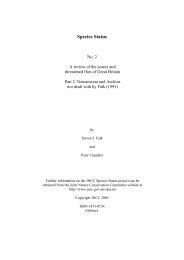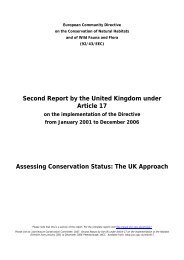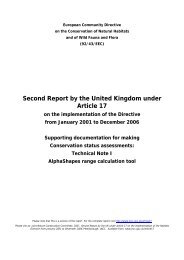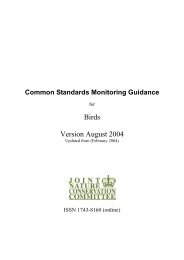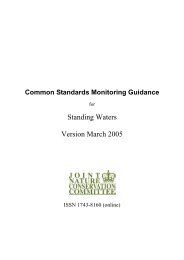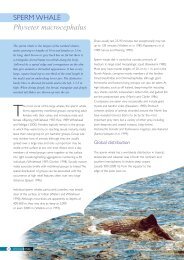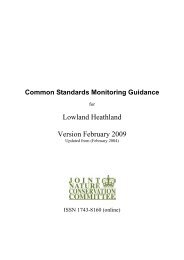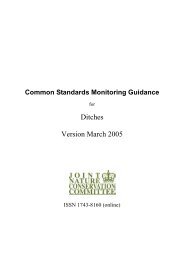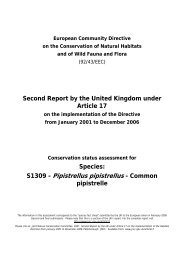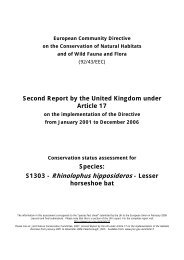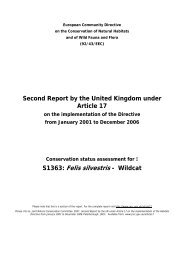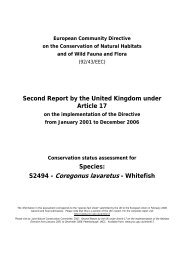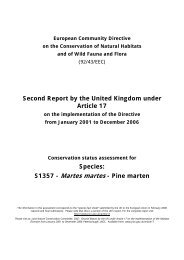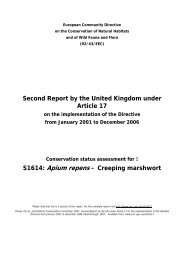UK Climate Change Programme 2006 - JNCC - Defra
UK Climate Change Programme 2006 - JNCC - Defra
UK Climate Change Programme 2006 - JNCC - Defra
You also want an ePaper? Increase the reach of your titles
YUMPU automatically turns print PDFs into web optimized ePapers that Google loves.
114<br />
Public sector<br />
48. The Higher Education Funding Council for<br />
England 17 (HEFCE) provides grants to institutions<br />
through their Leadership, Governance and<br />
Management Fund to support the development<br />
and promotion of good practice. In July 2005<br />
HEFCE published a strategy and action plan 18 ,<br />
setting out how, within the next ten years, the<br />
Higher education sector in England will achieve<br />
sustainability and tackle climate change. This will be<br />
a key cross-cutting theme of HEFCE’s strategic plan<br />
for <strong>2006</strong>-11, which will be published in April <strong>2006</strong>.<br />
46. To aid this process, the Government is<br />
developing a strategy on renewable energy<br />
generation and carbon reduction for schools.<br />
This will include a whole life costs toolkit to help<br />
decision makers prioritise expenditure on energy<br />
efficiency measures and low and zero carbon<br />
energy systems. The Government will work<br />
with the private sector and NDPBs to<br />
develop an approach to support schools in<br />
developing, as part of the primary capital<br />
programme, renewable energy generation to<br />
make the process easy, low (or zero) cost,<br />
and genuinely attractive to schools. This<br />
approach will promote excellent sustainable<br />
design, offer high efficiency potential, develop<br />
best practice partnering with the private sector<br />
and set out how to develop the skill necessary in<br />
schools, local authorities and the private sector.<br />
Higher and further education<br />
47. Higher education institutions have a significant<br />
impact on the environment. Each year they are<br />
responsible for consuming 5.2 billion kWh of<br />
energy at a cost of over £200m and spend £3bn<br />
on goods and services. They educate two million<br />
students and employ almost 300,000 staff, and<br />
have an opportunity to support a sustainable<br />
society by equipping students with the values,<br />
skills and knowledge to contribute to sustainable<br />
development. They also have the opportunity to<br />
generate and transfer knowledge through<br />
research and leadership of, and influence on,<br />
local, national and international networks.<br />
49. The Carbon Trust has developed a version of<br />
Carbon Management tailored to the needs of<br />
the Higher education sector. This provides technical<br />
and change management support to help the<br />
sector realise carbon emissions savings from areas<br />
such as academic, accommodation and leisure<br />
buildings and vehicle fleets. This is supported by<br />
a Higher Education Carbon Management Toolkit<br />
which provides process guidance, technical<br />
advice, case studies and a suite of specifically<br />
tailored tools. The pilot programme was launched<br />
in April 2005 to 20 universities and runs until<br />
March <strong>2006</strong>. The second phase is due to<br />
commence in May <strong>2006</strong> and will extend support<br />
to a further 25 universities.<br />
The Learning and Skills Council (LSC) estate<br />
is approximately 7.13 million square metres<br />
(excluding agricultural buildings and<br />
residences) and is responsible for consuming<br />
approximately 1.7 billion kWh of energy at a<br />
cost of over £43m per year.<br />
The Government expects providers, working<br />
with the Learning Skills Council, to<br />
demonstrate good governance in sustainable<br />
buildings and estate management which will<br />
see them undertake a review of the social,<br />
economic and environmental aspects of their<br />
organisations and identify areas for action.<br />
relating to energy, building and design,<br />
procurement and travel through for example,<br />
encouraging the use of video and telephone<br />
conferencing across the LSC to reduce business<br />
travel and ‘recycling’ redundant IT equipment<br />
for schools and charities.<br />
17 www.hefce.ac.uk/<br />
18 This is available at: www.hefce.ac.uk/pubs/hefce/2005/05_28/.


